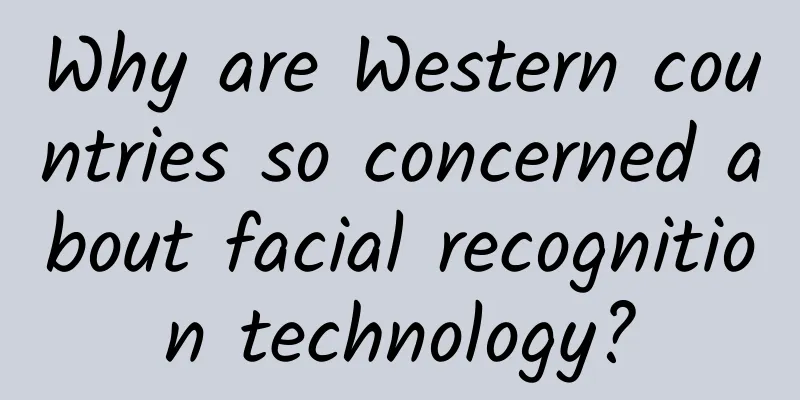Why are Western countries so concerned about facial recognition technology?

|
Facial recognition technology is now prevalent in every corner of the United States and Europe - at border crossings, police cars, stadiums, airports and high schools, raising public concerns about privacy and growing expectations that Congress will introduce restrictions.
Ed Markey, a Democratic senator from Massachusetts, said in June 2019 that he was preparing legislation to crack down on related software: Facial recognition technology poses a huge threat to Americans' privacy. Later, on Christmas Eve 2019, a research report released by the US government showed that some current software has higher recognition accuracy for Caucasians than for other people of color, which can be said to be perpetuating racial bias. Patrick Breyer, a member of the European Parliament from the German Pirate Party, also told the US political news website POLITICO: Facial recognition needs to be stopped until a fait accompli is established. Facial recognition technology is difficult to effectively contain However, curbing this technology has reached an impasse. In the United States and Europe, regulatory progress on facial recognition has been slow for two main reasons. On the one hand, governments are reluctant to curb the technology for security reasons. Currently, technology companies largely control where and how facial recognition is used, selling the technology to police departments and embedding it in consumer apps and smartphones. This situation persists even in the face of bipartisan resistance from Democrats and Republicans in the United States, and in Europe's most privacy-conscious countries, including Germany. In fact, police and security forces in Western countries are still testing and promoting this technology as a low-cost means of monitoring the public. Cameras and AI that can identify people based on their facial features are not uncommon at border checkpoints, police cars, and stadium entrances. Some high schools in the United States and Europe even use them to identify students. And the number of such examples far exceeds the number of cities such as San Francisco that have issued facial recognition bans. On the other hand, lawmakers' resistance to the technology has been hampered. In Washington, the House of Representatives once had hope of limiting the federal government's use of facial recognition through bipartisan cooperation, but for some reasons, the ban on facial recognition technology has stalled. In the Senate, proposals to limit the use of this technology by federal agencies have also been slow to gain support. Leifeng.com learned that one of the reasons for the poor progress in the House of Representatives was the death of former House Oversight and Government Reform Committee Chairman Elijah Cummings in October 2019. Elijah Cummings' group seemed ready to develop bipartisan legislation to restrict federal agencies' use of facial scanning technology, so several senior Democrats and Republicans on the committee were also involved in the months-long debate over Donald Trump's impeachment and subsequent Senate trial. Lawmakers from both parties acknowledged in interviews with POLITICO that their efforts have stalled. As Representative Mark Meadows of North Carolina, the top Republican on the subcommittee overseeing government operations, said: There has been no progress, and the death of Elijah Cummings has put that on hold. Meanwhile, in the European Union, top leaders called for swift action on regulating AI, but there is no guarantee there will be any binding restrictions in the bloc. Specifically, even the strict restrictions on the collection of “sensitive data” in the General Data Protection Regulation, the EU’s overarching privacy rule, include broad limits on government authorities, allowing public agencies to collect sensitive biometric data if they can justify it. As a result, the loophole has allowed facial recognition technology to pop up in places like Berlin’s main train station, where an experimental project by government authorities has scanned tens of thousands of passers-by. "Europe will have stricter restrictions on facial recognition" Despite this, Patrick Breyer said he believes Europe will ultimately have stricter restrictions on facial recognition than the United States because the EU's Charter of Fundamental Rights gives every European citizen "the right to protection of personal data concerning him or her," which will protect Europe from the abuse of facial recognition, while the U.S. Constitution does not mention this, let alone do so. The lawyer, who was trained as a lawyer, also said:
At the same time, some leaders in the technology industry have seized the opportunity to formulate any possible global rules. In December 2018, Microsoft President Brad Smith rarely stated that the use of facial recognition technology should follow six principles. In addition, Michael Punke, director of public policy at Amazon AWS, also urged lawmakers to pass legislation that would "protect civil rights while allowing continued innovation and practical use of this technology."
But for now, facial scanning tools are becoming commonplace for the public, and the technology is unsurprisingly being embraced by both the public sector and private industry. Say goodbye to privacy In fact, companies such as Facebook, Apple and Google have already embedded facial recognition capabilities in their most popular devices, such as using the technology to unlock phones or automatically tag friends in photos. Amazon has become the largest supplier of easy-to-use facial recognition systems, with users including police departments and US government agencies. The demand for facial recognition systems from government agencies seems endless. Across the United States, federal, state and local agencies have been conducting so-called experiments for years, with both the Transportation Security Administration and U.S. Customs and Border Protection using facial recognition technology at select points of entry. At the state and local level, police departments in Florida, Colorado and Oregon have begun adopting the technology, and other departments are exploring its uses. Meanwhile, the situation in Europe is no different: In the UK, two police forces have been testing facial recognition technology to identify passers-by in real time using street cameras, and the French government has introduced a facial recognition-enabled ID card in response to protests by digital rights groups. Hungary's Interior Ministry is installing 35,000 cameras in the capital Budapest and other parts of the country to capture faces and license plates. Some European airports, including Lisbon and Prague, already support facial recognition, allowing passengers from the European Union and Switzerland to have their faces scanned by automated border control systems, avoiding long lines. Matthias Monroy, a civil liberties activist working for the left-wing party Die Linke in the German parliament, said: This is worrying, as combined with the power of AI and high-performance computing, this technology may soon make it impossible for people to move anonymously in public places. Similarly, in early 2018, then-committee chairman Elijah Cummings warned at a hearing that under current law, the government could "put your face into a database without your knowledge that can be used in almost unrestricted ways." He later said that almost everyone (including Democrats and Republicans) had no objection to this. The road to curbing facial recognition is long and arduous In the U.S., the debate over facial recognition has centered on government use of the technology. After the American Civil Liberties Union released a report on Amazon’s sale of its image recognition AI system, Rekognition, to police departments, San Francisco became the first city in the world to ban local agencies from using the technology. The report also attracted attention in Washington. In Washington, a coalition of congressional Democrats and liberal-leaning Republicans, concerned about the impact of unchecked government surveillance, wants to limit the use of facial recognition technology by federal agencies such as the FBI, the Transportation Security Administration and Immigration and Customs Enforcement. The top Republican on the House Oversight Committee said in August 2019 that committee leaders had explored a bill that would block the federal government from funding any new or expanded uses of the technology. Separately, the committee’s incoming chairwoman, Rep. Carolyn Maloney (D-N.Y.), expressed a desire to reconsider the issue but stopped short of committing to pushing for a moratorium on federal use of the technology. Leifeng.com learned that even if such a proposal makes progress in the Democratic-controlled House of Representatives, it is likely to face opposition from moderate Republicans in the Republican-controlled Senate, many of whom view emerging technologies as important law enforcement tools. In December 2019, Senator Chris Coons told the media:
In fact, in November 2018, Chris Coons teamed up with liberal-leaning Utah Republican Senator Mike Lee to introduce legislation that would require federal agencies to obtain a warrant before using facial recognition for targeted surveillance. But more nuanced proposals, such as the above bill, have yet to gain support from any other co-sponsors and have failed to gain sufficient support in the Senate. In Brussels, the new president of the European Commission, Ursula von der Leyen, pledged to take on facial recognition. As part of her pledge, she will set binding rules for AI in the first 100 days of her term, which begins on December 1, 2018. At the same time, this coincides with a series of rulings by data protection agencies in various EU countries. These rulings call for cautious use of facial recognition (mainly dynamic facial recognition) and urge public departments to draft relevant legislation for the use of this technology. In the past few weeks, privacy watchdogs in Sweden, France and the United Kingdom have all issued position papers on the issue, and regulators in France and Sweden have banned facial recognition at the entrance of high schools. Of course, the European Commission's plans for AI don't necessarily mean that any EU-wide facial recognition rules will prevail. Despite the promise to codify recognized legal practices, European officials have different views on what AI-related laws should contain. Senior officials believe that this may be more like guiding principles rather than hard rules. That’s why courts and data protection regulators are likely to write these rules in Europe. In late August 2019, a British court struck down the first major attempt to restrict police use of facial recognition technology, saying the security benefits outweighed the risks to privacy and personal freedoms. Legal experts expect that European law enforcement facial recognition rules will come in the form of “ex post facto” regulations — law enforcement will take advantage of existing legal gray areas and begin deploying the technology until a judge or data protection authority limits or stops its use or makes a ruling consistent with existing law. There is no doubt that facial recognition technology will infringe on public privacy and freedom, but at the same time, we have to admit that this technology brings convenience to the public sector, private enterprises and individual consumers. How to use and how to curb it is related to law and morality, which is worth our deep consideration. Leifeng.com will continue to pay attention to it. This article is reproduced from Leiphone.com. If you need to reprint it, please go to Leiphone.com official website to apply for authorization. |
<<: Mobile QQ launches a fun feature: can display the other party's real-time battery level
>>: Can WeChat groups be rented out? It is true that you can make money lying down, but don’t do it.
Recommend
Android phone RAM can no longer be rolled up, good quality and low price are the best
As the 2022 Android flagships debut one after ano...
Essential for overseas promotion: What are the global advertising channels?
AppsFlyer breaks down data by industry verticals ...
4 tips to improve the work efficiency of operators!
The operations staff are all young people, so rap...
Advertising Cases | Traditional lending and driving test industry advertising cases and data references!
Today, I would like to share with you some invest...
Google launches new Qaya service: Help creators easily build online stores
The new project, Qaya, co-founded by Nathaniel Na...
How to play the second type of e-commerce information flow advertising!
When the Internet becomes a traditional industry,...
Major live streaming sales events in the first half of 2020
2020 can be said to be the year when live streami...
General Bradley's 2021 Trading Strategy Lecture
General Bradley's 2021 Trading Strategy Lectur...
Understand how Baidu did promotion in the early days in five minutes!
First, let me answer the question of “killer prom...
Apple recognizes Android's status Cook: Google has a dominant operating system in the world
Who is the world's number one mobile phone sy...
Amazon Amazon Global Store FBA Logistics Practical Course Value 518 Yuan (Completed)
Amazon Amazon Global Store FBA Logistics Practica...
A brief analysis of the current mainstream online education activities!
In recent years, online education has become a ho...
Maybe you don’t know yet, the App Store has an accelerated application review channel
The review speed of the App Store has always been...
iOS 15.4 optimizes 5G, signal is fully restored
Nowadays, 5G technology is developing rapidly, an...
Zhihu and Xiaohongshu traffic and algorithm logic
In many people's impressions, Zhihu's mai...


![[Case] How does an e-commerce app develop an operation and promotion strategy from scratch?](/upload/images/67cc4e8168971.webp)






